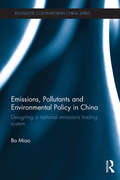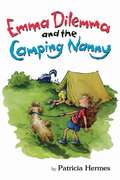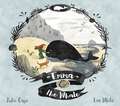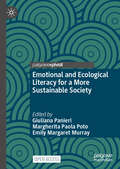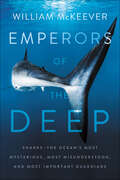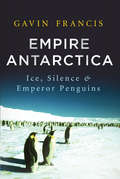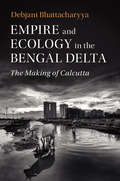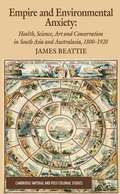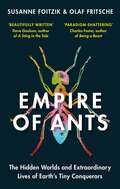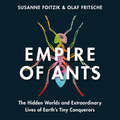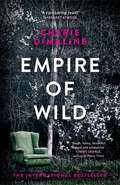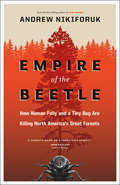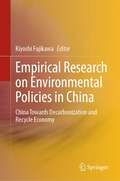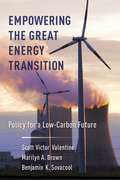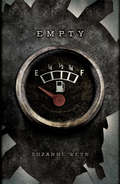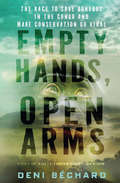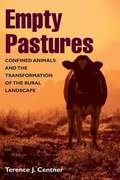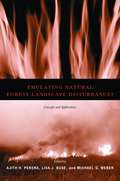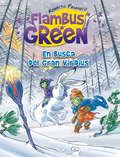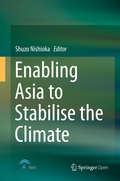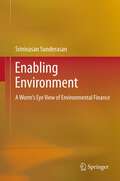- Table View
- List View
Emissions, Pollutants and Environmental Policy in China: Designing a National Emissions Trading System (Routledge Contemporary China Series)
by Bo MiaoAs the world's biggest polluter, the environmental challenges that China faces in controlling its airborne emissions are crucial, not only to its own population in terms of tackling the severe domestic air pollution, but also to the planet as it faces calls from the international community to accept its responsibilities in cutting greenhouse gases. Deteriorating air quality clearly shows that China’s current environmental regime is unsuited to either tackle the rampant domestic air pollution or contribute fairly to international climate action. As such, this book explores the feasibility of applying a national emissions trading system to control multiple air pollutants in China. It begins with an outline of the existing emissions management system and goes onto explore whether a national emissions trading system is a viable choice to combat China’s conventional air pollutants. To this end, there is an in-depth analysis of the two pilot sulphur dioxide emissions trading programs in Taiyuan and Jiangsu, as well as an examination of emissions trading schemes in the US and EU. Finally, the book discusses the key design elements of a multi-pollutant cap-and-trade scheme that addresses both conventional air pollutants and greenhouse gasses. This book will be of great interest to students and scholars interested in the fields of environmental studies, Chinese politics and environmental law. It will also be invaluable to policy makers in the field.
Emma Dilemma and the Camping Nanny
by Patricia HermesNine-year-old Emma O'Fallon finds herself in increasing difficulties as her complicated efforts to break up the growing attachment between Annie, the Irish nanny, and Bo, her boyfriend, cause chaos on a family camping trip and her own relationship with her best friend Luisa seems to be going from bad to worse.
Emma and the Whale
by Julie CaseIn this lyrical picture book with subtle conservation themes, a girl helps rescue a whale who has washed ashore. Here is a beautifully written, moving story that will appeal to all animal lovers, and to those interested in protecting our oceans and marine life. Emma lives in a crooked house in an old whaling town, and often takes her dog, Nemo, to the beach. On their walks, they find amazing treasures, like shells and stones and sea glass—and even a loggerhead turtle. But one day, they find something completely unexpected: a baby whale, washed ashore. Emma empathizes with the animal&’s suffering, imagining what the whale is thinking and feeling. When the tide starts to come in, Emma pushes as the water swirls and rises, and eventually the whale swims free, back to her mother.
Emotional Design and the Healthcare Environment (Research for Development)
by Marco Maria Maiocchi Zhabiz ShafieyounFor all of the tremendous advances in medicine and treatment the world has seen in the modern era, the human body’s ability to heal itself remains a (literally) vital and often overlooked facet of healthcare. Through the use of emotional design, aimed at transforming healthcare environments, such as waiting rooms, in such a way as to boost the emotional wellbeing of patients, and thus their general attitudes, including in regard to their own healing processes, medical institutions can improve outcomes for the people they treat while simultaneously lowering overall costs. Design, as an inherently transdisciplinary, problem-solving activity, is well-suited to this task. And when combined with a field of study such as neuroscience, which can literally map out the perceptions that lead to the experience of particular emotions, healthcare environments can be transformed into spaces (through such innovations as Kansei engineering) that then subsequently transform the people who rely on them the most, leading to more efficiency and less red ink.
Emotional and Ecological Literacy for a More Sustainable Society
by Margherita Paola Poto Giuliana Panieri Emily Margaret MurrayThis open access book aims to promote ecological and emotional research and education for sustainability by cultivating values and behaviours consistent with how nature makes us feel connected and nurtured. Built upon the intersection of ecological literacy and socio-emotional learning, grounded in sustainability and relational thinking, the research developed in the book covers a wide range of themes connected to the Agenda 2030.
Emperors of the Deep: Sharks—The Ocean's Most Mysterious, Most Misunderstood, and Most Important Guardians
by William McKeeverWhat we can learn from sharks—evolutionary marvels that have survived for 450 million years, and are essential to our planet’s ecosystem.We’re conditioned to see sharks as terrifying, cold-blooded underwater predators. But as Ocean Guardian founder William McKeever reveals, we need to ensure that their remarkable longevity continues. The first book to reveal in full the hidden lives of sharks, Emperors of the Deep focuses on four species—Mako, Tiger, Hammerhead, and Great White—as never before, including such fascinating details as:Sharks are 50 million years older than treesSharks have survived five extinction level events, including the one that killed off the dinosaursSharks have electroreception, a sixth sense that lets them pick up on electric fields generated by living thingsSharks can dive 4,000 feet below the surfaceSharks account for only six human fatalities per year, while humans kill 100 million sharks per yearMcKeever goes back through time to probe the shark’s prehistoric secrets and how it has become the world’s most feared, and most misunderstood, predator, and takes us on a pulse-pounding tour around the world and deep under the surface, from the frigid waters of the Arctic Circle to the coral reefs of the tropical Central Pacific. He also interviews ecologists, conservationists, and world-renowned shark experts, including the founders of Greenpeace’s Rainbow Warrior, the head of the Massachusetts Shark Research Program, and the self-professed “last great shark hunter.”At once a deep dive into the misunderstood world of sharks and an urgent call to protect them, Emperors of the Deep celebrates this wild species that hold the key to unlocking the mysteries of the ocean—if we can prevent their extinction from climate change and human hunters.“Many astonishing facts.” —The Guardian“[An] extraordinary book [that] rarely fails to inform and delight.” —The Washington TimesIncludes photographs
Empire Antarctica: Ice, Silence & Emperor Penguins
by Gavin FrancisGavin Francis fulfilled a lifetime's ambition when he spent fourteen months as the basecamp doctor at Halley, a profoundly isolated British research station on the Caird Coast of Antarctica. So remote, it is said to be easier to evacuate a casualty from the International Space Station than it is to bring someone out of Halley in winter.Antarctica offered a year of unparalleled silence and solitude, with few distractions and a very little human history, but also a rare opportunity to live among emperor penguins, the only species truly at home in he Antarctic. Following Penguins throughout the year -- from a summer of perpetual sunshine to months of winter darkness -- Gavin Francis explores the world of great beauty conjured from the simplest of elements, the hardship of living at 50 c below zero and the unexpected comfort that the penguin community bring.Empire Antarctica is the story of one man and his fascination with the world's loneliest continent, as well as the emperor penguins who weather the winter with him. Combining an evocative narrative with a sublime sensitivity to the natural world, this is travel writing at its very best
Empire and Ecology in the Bengal Delta: The Making Of Calcutta (Studies In Environment And History )
by Debjani BhattacharyyaWhat happens when a distant colonial power tries to tame an unfamiliar terrain in the world's largest tidal delta? <P><P>This history of dramatic ecological changes in the Bengal Delta from 1760 to 1920 involves land, water and humans, tracing the stories and struggles that link them together. Pushing beyond narratives of environmental decline, Bhattacharyya argues that 'property-thinking', a governing tool critical in making land and water discrete categories of bureaucratic and legal management, was at the heart of colonial urbanization and the technologies behind the draining of Calcutta. The story of ecological change is narrated alongside emergent practices of land speculation and transformation in colonial law. Bhattacharyya demonstrates how this history continues to shape our built environments with devastating consequences, as shown in the Bay of Bengal's receding coastline.<P> The first environmental history of land markets in South Asia.<P> Explores how the law responded to the ecological changes of the Bengal delta and how those laws continue to shape our contemporary relationship to the land and the water.<p> Shows landscapes as essentially fluid and changeable, destabilizing the fixities of cartography.
Empire and Environmental Anxiety
by James BeattieA new interpretation of imperialism and environmental change, and the anxieties imperialism generated through environmental transformation and interaction with unknown landscapes. Tying together South Asia and Australasia, this book demonstrates how environmental anxieties led to increasing state resource management, conservation, and urban reform.
Empire of Ants: The hidden worlds and extraordinary lives of Earth's tiny conquerors
by Olaf Fritsche Susanne Foitzik'Beautifully written and filled with mind-boggling wonders' - Dave Goulson, author of A Sting in the Tale'Thrilling, compellingly readable and paradigm-shattering' - Charles Foster, author of Being a Beast'Both expert and entertaining' - David Barrie, author of Incredible JourneysAnts have been walking the Earth since the age of the dinosaurs. Today there are one million ants for every one of us. The closer you get to ants, the more human they look: they build megacities, grow crops, raise livestock, tend their young and infirm, and even make vaccines. They also have a darker side: they wage war, enslave rivals and rebel against their oppressors. From fearsome army ants, who stage twelve-hour hunting raids where they devour thousands, to gentle leaf-cutters gardening in their peaceful underground kingdoms, every ant is engineered by nature to fulfil their particular role.Acclaimed biologist Susanne Foitzik has travelled the globe to study these master architects of Earth. Joined by journalist Olaf Fritsche, Foitzik invites readers deep into her world - in the field and in the lab - and will inspire new respect for ants as a global superpower.Fascinating and action-packed, Empire of Ants will open your eyes to the secret societies thriving right beneath your feet.
Empire of Ants: The hidden worlds and extraordinary lives of Earth's tiny conquerors
by Olaf Fritsche Susanne FoitzikAnts have been walking the Earth since the age of the dinosaurs. Today there are one million ants for every one of us. The closer you get to ants, the more human they look: they build megacities, grow crops, raise livestock, tend their young and infirm, and even make vaccines. They also have a darker side: they wage war, enslave rivals and rebel against their oppressors. From fearsome army ants, who stage twelve-hour hunting raids where they devour thousands, to gentle leafcutters gardening in their peaceful underground kingdoms, every ant is engineered by nature to fulfil their particular role.Acclaimed biologist Susanne Foitzik has travelled the globe to study these master architects of Earth. Joined by journalist Olaf Fritsche, Foitzik invites readers deep into her world - in the field and in the lab - and will inspire new respect for ants as a global superpower.Fascinating and action-packed, Empire of Ants will open your eyes to the secret societies thriving right beneath your feet.(p) Octopus Publishing Group 2021
Empire of Wild: A Novel
by Cherie DimalineA #1 INTERNATIONAL BESTSELLEROne of the most anticipated books of the summer for Time, Harper's Bazaar, Bustle and Publishers Weekly'Deftly written, gripping and informative. Empire of Wild is a rip-roaring read!' Margaret Atwood'Empire of Wild is doing everything I love in a contemporary novel and more. It is tough, funny, beautiful, honest and propulsive' Tommy Orange, author of There There 'Dimaline turns an old story into something newly haunting and resonant' New York Times'Close, tight, stark, beautiful - rich where richness is warranted, but spare where want and sorrow have sharpened every word. Dimaline has crafted something both current and timeless' NPR'Revelatory... Gritty and engaging, this story of a woman and her missing husband is one of candor, wit and tradition'Ms. Magazine Broken-hearted Joan has been searching for her husband, Victor, for almost a year - ever since he went missing on the night they had their first serious argument. One hung-over morning in a Walmart parking lot in a little town near Georgian Bay, she is drawn to a revival tent where the local Métis have been flocking to hear a charismatic preacher. By the time she staggers into the tent the service is over, but as she is about to leave, she hears an unmistakable voice.She turns, and there is Victor. Only he insists he is not Victor, but the Reverend Eugene Wolff, on a mission to bring his people to Jesus.With only two allies - her Johnny-Cash-loving, 12-year-old nephew Zeus, and Ajean, a foul-mouthed euchre shark with deep knowledge of the old Métis ways - Joan sets out to remind the Reverend Wolff of who he really is. If he really is Victor, his life and the life of everyone she loves, depends upon her success.Inspired by traditional Métis legends, Cherie Dimaline has created a propulsive, stunning and sensuous novel.
Empire of the Beetle
by Andrew NikiforukBeginning in the late 1980s, a series of improbable bark beetle outbreaks unsettled iconic forests and communities across western North America. An insect the size of a rice kernel eventually killed more than 30 billion pine and spruce trees from Alaska to New Mexico. Often appearing in masses larger than schools of killer whales, the beetles engineered one of the world's greatest forest die-offs since the deforestation of Europe by peasants between the eleventh and thirteenth centuries. The beetle didn't act alone. Misguided science, out-of-control logging, bad public policy, and a hundred years of fire suppression created a volatile geography that released the world's oldest forest manager from all natural constraints. Like most human empires, the beetles exploded wildly and then crashed, leaving in their wake grieving landowners, humbled scientists, hungry animals, and altered watersheds. Although climate change triggered this complex event, human arrogance assuredly set the table. With little warning, an ancient insect pointedly exposed the frailty of seemingly stable manmade landscapes.Drawing on first-hand accounts from entomologists, botanists, foresters, and rural residents, award-winning journalist Andrew Nikiforuk, investigates this unprecedented beetle plague, its startling implications, and the lessons it holds.
Empirical Research on Environmental Policies in China: China Towards Decarbonization and Recycle Economy
by Kiyoshi FujikawaThis book presents an empirical study of the effects of environmental policies on China and its neighboring countries, with a focus on waste and climate policies in China. The two major carbon policies have to do with carbon markets and renewable energy. The authors first examine the effectiveness of the Asian carbon market. Because of the consumption of goods beyond provincial borders, nationwide carbon markets are rather difficult to operate; therefore, a desirable initial allocation in the carbon market is proposed in this book. As for renewable power, its sources have not been fully utilized owing to a regional mismatch of supply and demand, so optimal locations of renewable energy are shown. The book also contains an analysis of the environmental and economic impacts of changes in resource circulation in East Asia. Although motorization is advancing rapidly, the vein industry for recycling used cars has not progressed. The authors estimate the amount of materials from used cars including new energy vehicles (electric and fuel cell vehicles) and propose desirable policies for used vehicles. East Asia is interdependent with respect to carbon and waste as well as the economy. China has regulated the import of waste recently and has started recycling its own wastes, putting pressure on neigboring countries to recycle their waste domestically. The authors estimate the environmental and economic impacts of such policy changes.
Empowering the Great Energy Transition: Policy for a Low-Carbon Future
by Scott Valentine Benjamin Sovacool Marilyn BrownAt a time when climate-change deniers hold the reins of power in the United States and international greenhouse gas negotiations continue at a slow crawl, what options are available to cities, companies, and consumers around the world who seek a cleaner future? Scott Victor Valentine, Marilyn A. Brown, and Benjamin K. Sovacool explore developments and strategies that will help fast-track the transition to renewable energy. They provide an expert analysis of the achievable steps that citizens, organizational leaders, and policy makers can take to put their commitments to sustainability into practice.Empowering the Great Energy Transition examines trends that suggest a transition away from carbon-intensive energy sources is inevitable—there are too many forces for change at work to stop a shift to clean energy. Yet under the status quo, change will be too slow to avert the worst consequences of climate change. Humanity is on a path to incur avoidable social, environmental, and economic costs. Valentine, Brown, and Sovacool argue that new policies and business models are needed to surmount the hurdles separating the current consumption model from a sustainable energy future. Empowering the Great Energy Transition shows that with well-placed efforts, we can set humanity on a course that supports entrepreneurs and communities in mitigating the environmental harm caused by technologies whose time has come and gone.
Empty
by Suzanne WeynA dystopic look at what happens to one American town when all the fossil fuels run out...It's the near future - the very near future - and the fossil fuels are running out. No gas. No oil. Which means no driving. No heat. Supermarkets are empty. Malls have shut down. Life has just become more local than we ever knew it could be.Nobody expected the end to come this fast. And in the small town of Spring Valley, decisions that once seemed easy are quickly becoming matters of life and death. There is hope - there has to be hope - just there are also sacrifices that need to be made, and a whole society that needs to be rethought.
Empty Hands, Open Arms: The Race to Save Bonobos in the Congo and Make Conservation Go Viral
by Deni Ellis Béchard&“Absorbing . . . Béchard&’s masterful, adventure-driven reporting delivers an inspiring account of an all-too-rare ecological success story.&” —Booklist Bonobos have captured the public imagination, due not least to their famously active sex lives. Less well known is the fact that these great apes don&’t kill their own kind, and that they share nearly 99% of our DNA. Their approach to building peaceful coalitions and sharing resources has much to teach us, particularly at a time when our violent ways have pushed them to the brink of extinction. Animated by a desire to understand bonobos and learn how to save them, Deni Ellis Béchard traveled into the Congo. Empty Hands, Open Arms is the account of this journey. Along the way, we see how partnerships between Congolese and Westerners, with few resources but a common purpose and respect for indigenous knowledge, have resulted in the protection of vast swaths of the rainforest. And we discover how small solutions—found through openness, humility, and the principle that poverty does not equal ignorance—are often most effective in tackling our biggest challenges. Combining elements of travelogue, journalism, and natural history, this incomparably rich book takes the reader not only deep into the Congo, but also into our past and future, revealing new ways to save the environment and ourselves. &“Riveting [and] surprisingly uplifting.&” —David Suzuki, author of The Sacred Balance &“The embodiment of the type of reporting that we dream of reading, but all too rarely encounter—intelligent, engaged, and above all, astonishingly perceptive.&” —Dinaw Mengestu, author of The Beautiful Things That Heaven Bears Also published as Of Bonobos and Men.
Empty Pastures: Confined Animals and the Transformation of the Rural Landscape
by Terence J. CentnerOver the past century American agriculture has shifted dramatically with small, commercial farms finding it increasingly difficult to compete with large-scale (mostly indoor) animal feeding operations (AFOs). In this book, Terence J. Centner investigates the environmental, social, economic, and political impact of the rise of the so-called factory farm, exposing the ramifications of the contemporary trend toward industrial-scale food production. Just as Rachel Carson's landmark Silent Spring used the disappearance of songbirds as a jumping-off point for a work that raised public awareness of pesticides' devastating environmental impact, Empty Pastures sees the dwindling numbers of livestock in the American countryside as a symptom of a broader transformation, one with serious consequences for the rural landscape and its inhabitants--animal as well as human. After outlining the rise of the AFO, Centner examines the troubling consequences of consolidation in animal farming and suggests a number of remedies. The issues he tackles include groundwater contamination, the loss of biodiversity, animal welfare, concentrated odors and other nuisances, soil erosion, and the economic effects of the disappearance of the small family farm. Inspired by largely abandoned traditional practices rather than a radical and unrealistic vision of a return to an idealized past, Centner proposes a series of pragmatic reforms for regulating factory farms to halt ecological degradation and revitalize rural communities.
Emulating Natural Forest Landscape Disturbances: Concepts and Applications
by Ajith H. Perera Lisa J. Buse Michael G. WeberThis comprehensive collection of provocative papers provides a scientific foundation for justifying the use of and a solid framework for examining the ambiguities inherent in emulating natural forest landscape disturbance. Contributors range from policymakers and forestry professionals to academics and conservationists, offering a balanced view of the promises and challenges of the forest management paradigm in sustaining forest landscapes.
Emulating Natural Forest Landscape Disturbances: Concepts and Applications (Forest Research Information Paper Ser. #No. 149)
by Lisa J. Buse Michael G. Weber Eds. Perera Ajith H.What is a natural forest disturbance? How well do we understand natural forest disturbances and how might we emulate them in forest management? What role does emulation play in forest management? Representing a range of geographic perspectives from across Canada and the United States, this book looks at the escalating public debate on the viability of natural disturbance emulation for sustaining forest landscapes from the perspective of policymakers, forestry professionals, academics, and conservationists. This book provides a scientific foundation for justifying the use of and a solid framework for examining the ambiguities inherent in emulating natural forest landscape disturbance. It acknowledges the divergent expectations that practitioners face and offers a balanced view of the promises and challenges associated with applying this emerging forest management paradigm.The first section examines foundational concepts, addressing questions of what emulation involves and what ecological reasoning substantiates it. These include a broad overview, a detailed review of emerging forest management paradigms and their global context, and an examination of the ecological premise for emulating natural disturbance. This section also explores the current understanding of natural disturbance regimes, including the two most prevalent in North America: fire and insects. The second section uses case studies from a wide geographical range to address the characterization of natural disturbances and the development of applied templates for their emulation through forest management. The emphasis on fire regimes in this section reflects the greater focus that has traditionally been placed on understanding and managing fire, compared with other forms of disturbance, and utilizes several viewpoints to address the lessons learned from historical disturbance patterns. Reflecting on current thinking in the field, immediate challenges, and potential directions, the final section moves deeper into the issues of practical applications by exploring the expectations for and feasibility of emulating natural disturbance through forest management.
En busca del Gran Viridius (Saga Flambus Green #Volumen)
by Roberto Pavanello¡El jefe supremo de los dusig ha desaparecido! Didí y Flambus no pararán hasta averiguar qué le ha ocurrido. Flambus y los demás duendes de Futura están muy preocupados porque desde hace días no tienen noticias del Gran Viridius, el duende más anciano y sabio de los dusig, que está de viaje en una peligrosa misión. Didí ha decidido salir a buscarle inmediatamente. Por supuesto, su inseparable amigo Flambus partirá con ella. ¿Conseguirán los dos valientes duendes encontrar al Gran Viridius? «Yo, Flambus Green, juro defender los árboles que me han sido confiados a costa de mi propia vida y hacer buen uso de la verdesavia que recibiré en ofrenda»
En la calle de las Praderas (¡Arriba la Lectura!, Read Aloud Module 7 #2)
by Henry ColeNIMAC-sourced textbook
En noviembre (¡Arriba la Lectura!, Trade Book #6)
by Cynthia Rylant Jill KastnerNIMAC-sourced textbook
Enabling Asia to Stabilise the Climate
by Shuzo NishiokaThis book presents good practices in Asia and ASEAN countries for effectively promoting advances in response to climate change, which can help to achieve sustainable development in Asia and around the world. As a proposal, the aim is to influence the discussions at COP 21 by providing a positive agenda with concrete actions from an Asian perspective. The book is divided into three parts. Part 1 describes the greenhouse gas (GHG) reduction scenario from an Asian perspective and in line with global 2 ° targets. Based on modeling analysis, the studies demonstrate the theoretical potentials and send the policymakers at COP 21 the positive message that "Asia can reach the target. " As Asian countries vary in terms of their economic strength, country-specific scenario studies for the two giants China and India as well as for Japan and Vietnam are introduced to show the different approaches for each country. Part 2 shows successful examples of how modeling analysis are reflected in actual policy development, which provides practical guidelines to help policymakers develop their own roadmaps with stakeholder dialogue, not only in Asia but also in other regions of the world. The Nationally Appropriate Mitigation Action (NAMA) roadmap development in Thailand as well as the Iskandar Malaysia project show at the country and city level how researchers and policymakers are working closely to succeed. Part 3 focuses on a number of sector-specific activities including transportation, forestry, capacity development, and inventory work in Asia. Rather than discussing the Low Carbon Society (LCS) concept in detail, the respective chapters highlight unique, concrete, and practically applicable examples from Asia, showing how Asian countries are addressing climate change mitigation issues in a collaborative manner, an approach that can be replicated in other regions. While the ultimate goal of this book is to facilitate international climate regime making, local government and international organizations (United Nations, World Bank, and others) officers, researchers, international NGO/NPOs, consultants, students (particularly those studying international relationships or environmental studies), as well as reporters will find this book useful in broadening their understanding of low-carbon development in Asia.
Enabling Environment
by Srinivasan SunderasanEnabling Environment is as real as it gets. The global commons are jointly owned and their inhabitants are jointly obligated to ensure their preservation. In the face of protracted negotiations, convoluted documentation, discord, and incessant bickering among scientists, activists, pressure groups of various hues, politicians and negotiators, very often the people on the ground are ignored or taken for granted. In the meantime, life meanders along. It is these 'everyday individuals' who make consumption-related choices on their lifestyles, travel or on preferring certain products or services over others. Enabling Environment puts the individual front and center. Ecosystem services need to be recognized, appropriately priced and the costs allocated to the agents concerned. Enabling Environment is about defining economic and non-economic incentive structures and utilizing them to arrive at pro-environmental outcomes. This collection of articles illustrates the use of existing social, economic and regulatory structures, and the financial architecture and instruments, suitably modified or extended, to help internalize the environmental externality.
